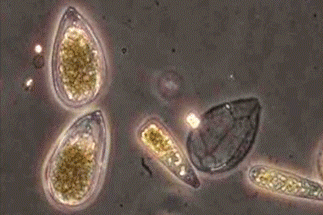All Research News articles
-
 News
NewsThe gut bacteria that put the brakes on weight gain in mice
Research has identified a specific type of gut bacteria, called Turicibacter, that improves metabolic health and reduces weight gain in mice on a high-fat diet. People with obesity tend to have less Turicibacter, suggesting that the microbe may promote healthy weight in humans as well.
-
 News
NewsStrengthening asphalt roads with a unique green ingredient: Algae
Researchers propose a figurative and literal green solution to improve the durability of roads and sidewalks: an algae-derived asphalt binder. For temperatures below freezing, results indicated that the algae binder reduced asphalt cracks when compared to a conventional, petroleum-based binder.
-
 News
NewsHarnessing the positive health benefits of microbes
A new article introduces the ‘Database of Salutogenic Potential’, a world-first prototype open-access repository that catalogues microbes and natural compounds linked to positive health outcomes.
-
 News
NewsRising heat reshapes how microbes break down microplastics, new review finds
A new review examines how high and extreme temperatures influence the ability of microorganisms to degrade microplastics. The authors show that heat can both accelerate and suppress microbial breakdown of plastic particles, depending on conditions and the organisms involved.
-
 News
NewsA new study reveals the microbial biodiversity of dehesa soil
A study reveals the underground interactions between fungi and oomycetes in twenty Andalusian dehesas, wooded pasturelands typical of the Iberian Peninsula, making it possible to identify the role of water as the main driver of microorganism diversity and to shed new light on the pathogen responsible for la seca.
-
 News
NewsFor certain life-essential proteins in E. coli, repair is more likely
A new study shows that E. coli proteins containing a specific structure are more likely to misfold and, if they are required the bacteria’s survival, more likely to be repaired.
-
 News
NewsStudy reveals high stakes of early immune development—and a potential probiotic fix
Scientists find that certain gut bacteria are essential for building immune defenses during infancy, pointing to new strategies for protecting children’s health. They have identified a way to preserve healthy immune development even when infants need antibiotic treatment.
-
 News
NewsScientists discover fungus that kills toxic algae threatening human health
A team of researchers have discovered a previously unknown species of marine fungus that can kill harmful, bloom-forming algae. The new species, Algophthora mediterranea, is a form of microscopic chytrid fungus that can occupy a broad range of hosts.
-
 News
NewsCancer-fighting bacterial product ‘cocktails’ may offer personalized treatment
Bacteria may be the next frontier in cancer treatment, according to researchers who devised a new approach of creating bacteria-derived mixtures — or cocktails — to help fight bladder cancer. They found that the cocktails significantly boost the immune system’s ability to fight cancer.
-
 News
NewsStudy showcases resilience and rapid growth of ‘living rocks’
South Africa is home to some of the oldest evidence of life on Earth, contained in rocky, often layered outcroppings called microbialites. Like coral reefs, these complex “living rocks” are built up by microbes absorbing and precipitating dissolved minerals into solid formations. Source: Rachel Sipler, Bigelow Laboratory for ...
-
 News
NewsCOVID-19 leaves a lasting mark on the human brain
COVID-19 does not just affect the respiratory system, but also significantly alters the brain in people who have fully recovered from the infectious disease, highlighting the long-term neurological impact of the virus.
-
 News
NewsSoil bacteria and fungi emerge as a top predictor of childhood allergic disease
The unique blend of fungi and bacteria in a region’s soil may be the strongest factor explaining its rates of childhood allergic disease, with certain assemblages of soil critters appearing linked with better health outcomes, according to new research.
-
 News
NewsMoss and symbionts offer a promising solution for removing metals from mining and forestry-impacted waters
New findings shed light on the mechanisms behind a natural purification process and identify the key microbial “teammates” that enable mosses to remove metals from water. The new study reveals that mosses do not remove metals alone. The key is the cooperation between the moss and its microbial symbionts.
-
 News
NewsNew one-two punch could knock out drug-resistant TB
Researchers found that pairing the antibiotic rifampicin with a second compound turned multidrug resistance into a weakness—providing proof of concept for using basic science to design life-saving dual-drug strategies.
-
 News
NewsCan certain bacteria regulate aging of the immune system and its related alterations?
Researchers have discovered a strain of Lentilactobacillus capable of preventing and even reversing aging-related immune alterations. Feeding aged mice with heat-inactivated YRC2606 resulted in lowered levels of inflammatory cytokines and signaling proteins.
-
 Careers
CareersCBCTA 2024 oral presentation winners: Isabella and Lia take home the honours
Letters in Applied Microbiology sponsored the best oral presentation award at the 29th Brazilian Congress of Food Science and Technology (CBCTA 2024). Winner Isabella Bassoto Xavier and runner-up Lia Mariano Aquino take a dive into their research.
-
 News
NewsUnseen allies: symbiotic bacteria help clean wastewater, but there is a catch
Scientists have identified new species of denitrifying endosymbionts in wastewater, highlighting their global prevalence – with an unexpected climate implication.
-
 News
NewsGut bacteria from amphibians and reptiles achieve complete tumor elimination
Researchers have discovered that the bacterium Ewingella americana, isolated from the intestines of Japanese tree frogs (Dryophytes japonicus), possesses remarkably potent anticancer activity.
-
 News
NewsHidden viruses in wastewater treatment may shape public health risks, study finds
A new study reveals that viral communities in wastewater treatment plants are far more complex and influential than previously recognized, with implications for water safety, antibiotic resistance, and how treatment performance is monitored.
-
 News
NewsWho is more likely to get long COVID?
Scientists have identified the key genetic drivers behind long COVID, revealing why some people continue to experience debilitating symptoms long after their initial infection.
